Crematogaster (Oxygyne) margaritae Emery
  Type location Congo
(Crematogaster Margaritae n.
sp., Emery, 1895h: 31, queen - see below; Mayr, 1896: 243, worker &
male)
collected
at Kuilu Type location Congo
(Crematogaster Margaritae n.
sp., Emery, 1895h: 31, queen - see below; Mayr, 1896: 243, worker &
male)
collected
at Kuilu
subspecies
cupida (Cremastogaster
(Oxygyne) margaritae Emery stirps cupida n. st., Santschi, 1935a:
261, illustrated,
worker) from Zaïre, Luebo-Macaco, 27.ix. 1921, Dr Schouteden -
see below
(see Bolton, 1995); all
forms described  . .
Note: With a
fresh specimen from the Central African Republic, I have raised Crematogaster
(Oxygyne) brevarmata (Cremastogaster
Santschii For. v. brevarmata n. var.,
Forel, 1915c: 337, worker & male; Santschi, 1930a: 65, queen) from Zaïre,
collected at Kondué, by Luja, to full species status. Not only
does brevarmata have a
flatter profile to the alitrunk, with shorter propodeal teeth, but it
is larger, TL 2.9-3.4, and has a shorter scape.
The queen of lujae is totally different to the type queen of
margaritae. and probably is the queen of brevarmarta. See Crematogaster lujae (Cremastogaster
(Oxygyne) Margaritae Em. r. Lujae
n. stirps, Forel, 1913b: 325, queen) also from Zaïre, Kondué,
by Luja - see http://www.antweb.org/specimenImages.do?code=rmcaent000017764 |
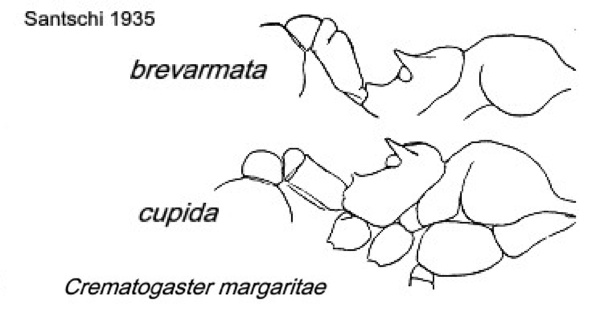 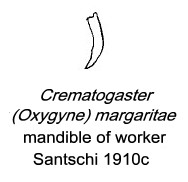 Emery's (1895h) description is at Emery's (1895h) description is at  . Mayr's (1896) description of the worker
& male is at . Mayr's (1896) description of the worker
& male is at  and and  . Forel's (1913b) description of lujae
is at . Forel's (1913b) description of lujae
is at  . Santschi (1910c) in a
discussion of Cr. depressa and Cr. julienni, gave an
illustration of the mandible of Cr. margaritae (left).
Forel's (1915c) description of brevarmata is at . Santschi (1910c) in a
discussion of Cr. depressa and Cr. julienni, gave an
illustration of the mandible of Cr. margaritae (left).
Forel's (1915c) description of brevarmata is at  . Santschi's (1935a)
illustrated consideration with cupida is at . Santschi's (1935a)
illustrated consideration with cupida is at  . .
Wheeler (1922) listed the type form from Cameroun
(Sjöstedt). Santschi (1935a: 260 & 261) has the drawings (right) of
brevarmata and cupida,
specimens from Mongende and Kasai Kondue, Zaïre (which he
spells as breviarmata, Wheeler had brevarmata and cupida.
|
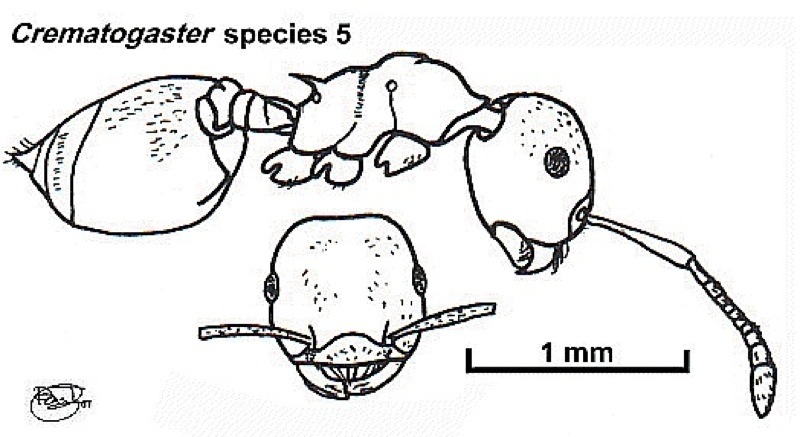
WORKER (Nigeria specimens, Crematogaster sp 5 in Taylor, 1979:
41) TL 3.11 mm, HL 0.70, HW 0.68,
SL 0.56, PW 0.40
Colour very dark red-brown, antennal funiculi yellow brown. Highly
polished appearance with little or no sculpturation. Pilosity short and
sparse, erect hairs only on apices of clypeus and gaster. Head near
ovoid in frontal view. Alitrunk profile very convex, mesonotum slightly
humped, no metanotal groove. Dorsal propodeum curved, spines straight
narrow, acute and upwardly directed. Postpetiole flattened in profile,
trapezoidal in front view, lower edge with acute lateral angles, upper
edge slightly rounded and medially impressed. First gastral tergite
with rounded acute anterolateral corners.
CRIN museum had two specimens from Nigeria,
collected at CRIN (B. Bolton), and noted as commensal with Crematogaster gambiensis
on a tree.
|
Queen
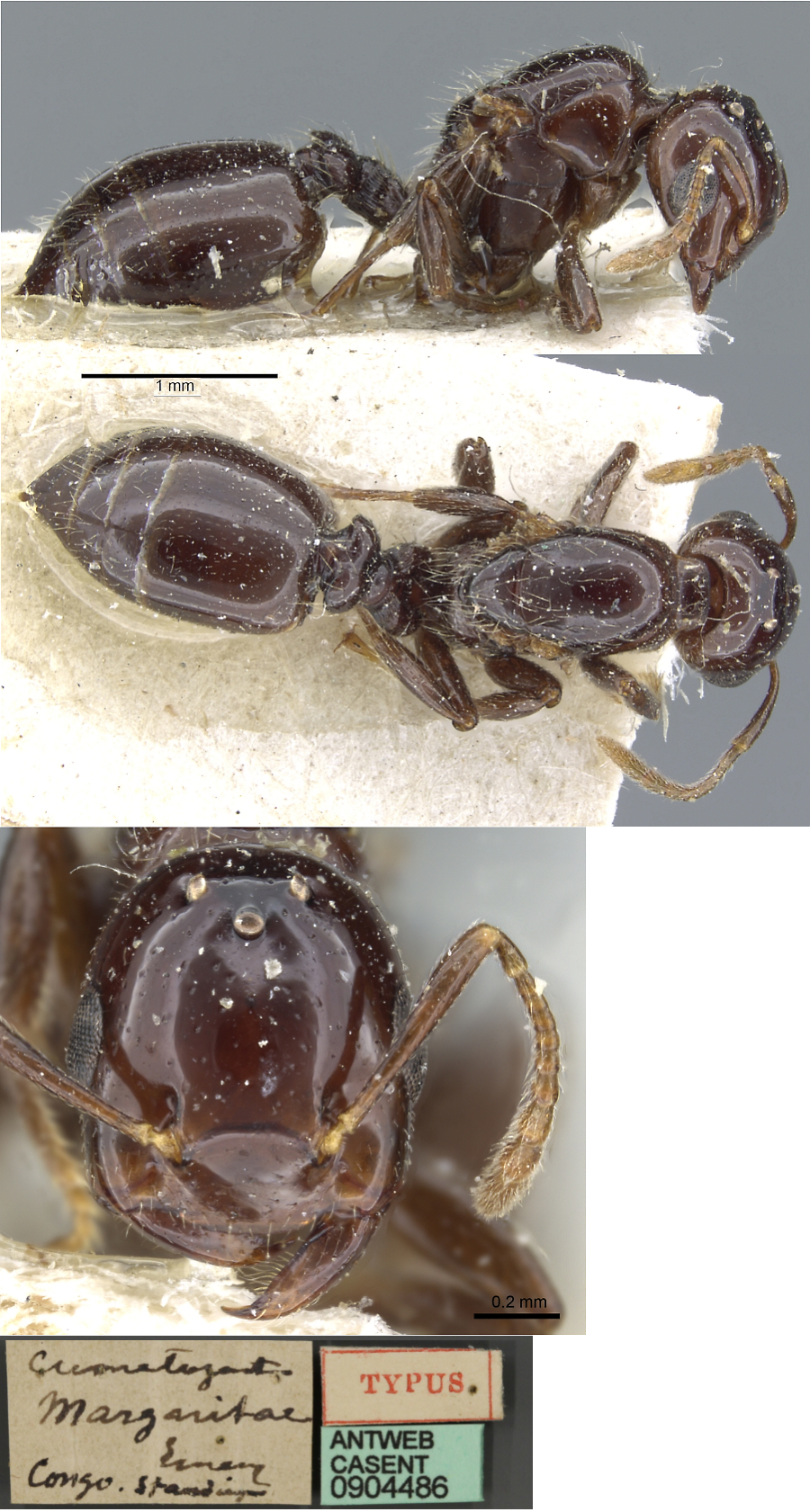 The
photomontage of the holotype queen is collated from http://www.antweb.org/specimen.do?name=casent0904486. The
photomontage of the holotype queen is collated from http://www.antweb.org/specimen.do?name=casent0904486.
|
Worker
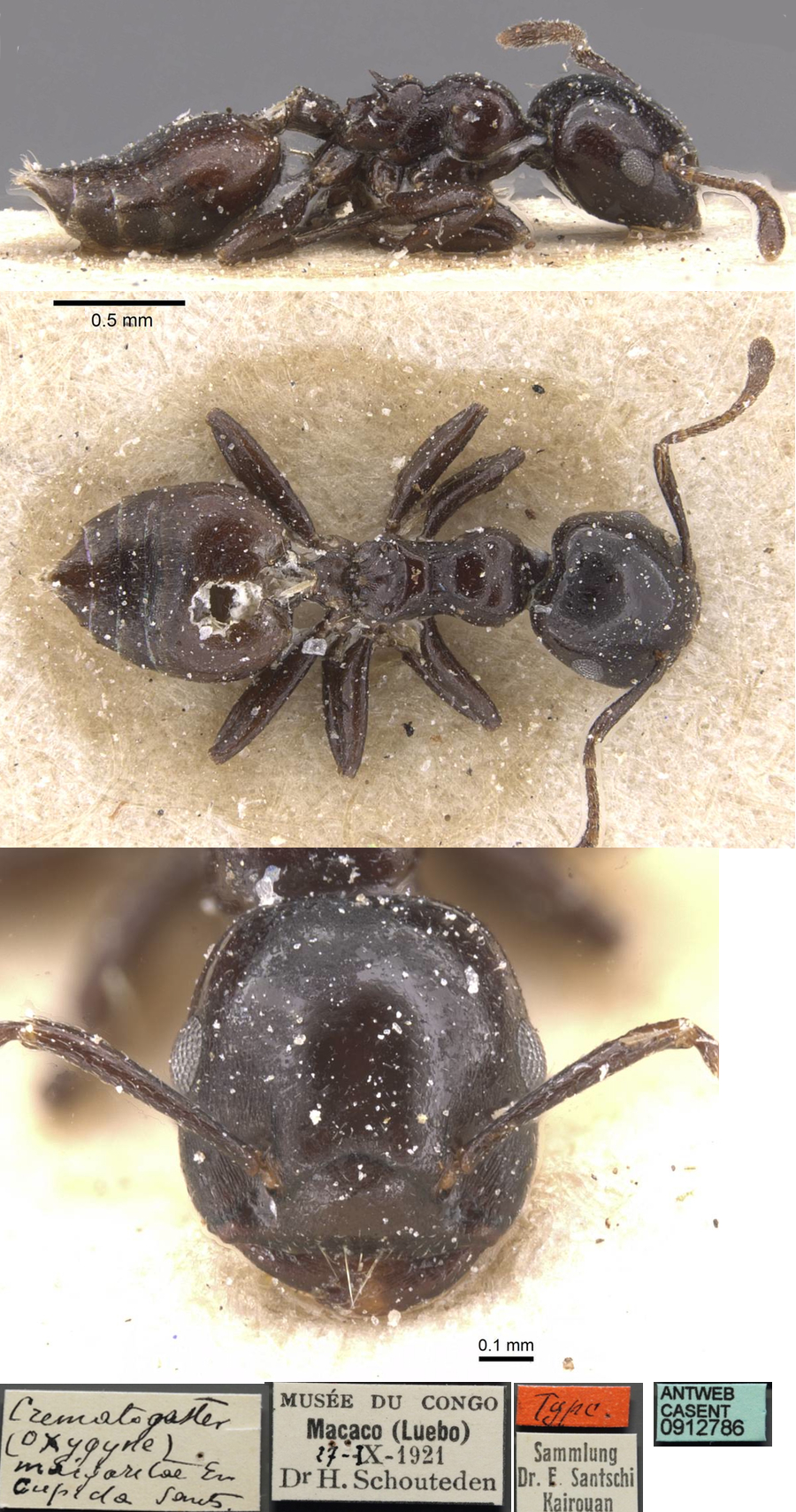 The
photomontage of the cupida
type worker is collated from http://www.antweb.org/specimen.do?name=casent0912786. The
photomontage of the cupida
type worker is collated from http://www.antweb.org/specimen.do?name=casent0912786.
|
Oxford University Museum
specimens
Crematogaster (Oxygyne) margaritae
B Taylor det.
|
Cameroun
G Debout & A Dalecky
Cameroon 66
|
18.iv.2001
BOU
3°13.31' N
10°15.01' E
|
on a domatia bearing
and lianescent Rubiaceae
|
2
|
 |
Crematogaster (Oxygyne) margaritae
B Taylor det. |
Central African
Republic
P Annoyer
Di-15
|
20.i.2005
Dzanga-Sangha
03°55’13.2" N
16°36’46.1" E
|
536m; U.V : 2h-6h,
après Sefka (entre Bambio et croisement Nola/Berberati), dans layon
forestier;
from on a reduviid bug; collected in forest, 1st hour of the morning
head only found
|
1
|
 |
Crematogaster (Oxygyne) margaritae
B Taylor det.
Queen
|
Central African
Republic
P Annoyer
FG
|
09.ii.2005
Dzanga-Sangha
02°50'03.0" N
16°08'11.2" E
|
375 m; Camp 3;
18h30-6h30;
Sur plate-forme à 35 m du sol dans un Terminalia (Terminalia superba,
Combretaceae)
|
1
|
 |
Crematogaster (Oxygyne) margaritae
B Taylor det.
Queen
|
Central African
Republic
P Annoyer
LS
|
15.xi.2010
Dzanga-Sangha
2°27'11.6"N
16°04'58.7"E
|
343 m; jour, à vue
derrière le village, Molongo, strate arbustive (Casside land)
|
2
|
 |
|
Santschi (1935) described cupida as
follows (my
translation) - (comparison with brevarmata)
TL 2.8 mm. Shiny, head and gaster black; often the rest of the body and
appendages black brown; ends of mandibles, funiculi and tarsi rust or
brownish red. Genae of head longitudinally striated up to the eyes;
Clypeus, area of promesonotum suture, sides of alitrunk, part of
petiole feebly shagreened and less shiny; gaster more or less wholly
shagreened and dull; pubescence very short, spaced out on the gaster
and appendages and rare elsewhere. Head slightly longer than wide,
feebly impressed rearwards, the posterior border feebly convex and the
angles very rounded; occipitum slightly concave; eyes slightly behind
the midpoint of the sides and just under a quarter the length of the
head. Anterior clypeal border slightly impressed, less than brevarmata.
Scape reaching about the vertex. Mandibles straight, smooth and shiny.
Second segment of the funiculus slightly longer than wide, 3-6 equally
wide as long, Promesonotum profile more convex, metanotal groove more
deeply impressed; propodeum dorsum shorter and more convex in profile,
spines as short but space between bases slightly larger. Dorsum of
petiole near as wide as long, trapezoidal, sides arced but more
convergent posteriorly. Postpetiole less impressed medially now longer
than petiole.
|
 Cameroun
- south-western tropical coastal forest area between Edéa and Campo
(McKey Wolbachia project) - Cameroon 66 from location BOU
(Bondé - river near N'kolobondé at 3°13.31' N 10°15.01'; flat land,
between the Chapel and the river), 18 April 2001, on a domatia bearing
and lianescent Rubiaceae. Cameroun
- south-western tropical coastal forest area between Edéa and Campo
(McKey Wolbachia project) - Cameroon 66 from location BOU
(Bondé - river near N'kolobondé at 3°13.31' N 10°15.01'; flat land,
between the Chapel and the river), 18 April 2001, on a domatia bearing
and lianescent Rubiaceae.
The specimens are almost unsculptured and highly
polished, some very faint striations on anterior of face and minute
puncturation. Dark brown except for mandibles and antennal funiculi,
notably the clubs which are lighter orange-brown. Scattered decumbent
pilosity; only erect hairs on anterior margin of clypeus, a pair on the
postpetiole and, a number on the ventral gaster. In full face view,
head near square, narrowed slightly forward and the vertex moderately
impressed. In profile head globular, with clypeus raised slightly.
Condylar bulbs exposed, as frontal carinae no more than lateral margin
of the clypeus. Eyes quite small with midline forward of midline of
face; set right on the sides of the head and only slightly convex.
Pronotum dorsally concave; the anterior corners angular with a sharp
transition from the dorsal to lateral pronotum. Promesonotal suture
visible as a distinct impression; mesonotum with raised broad carina.
Propodeum sloping downwards from distinct metanotal groove; spines
short pointing upwards and outward; spiracle protruding and set into
the base of the spines. Petiole relatively long and without a
subpetiolar process.
This may be a misidentification ? = striatula?
|
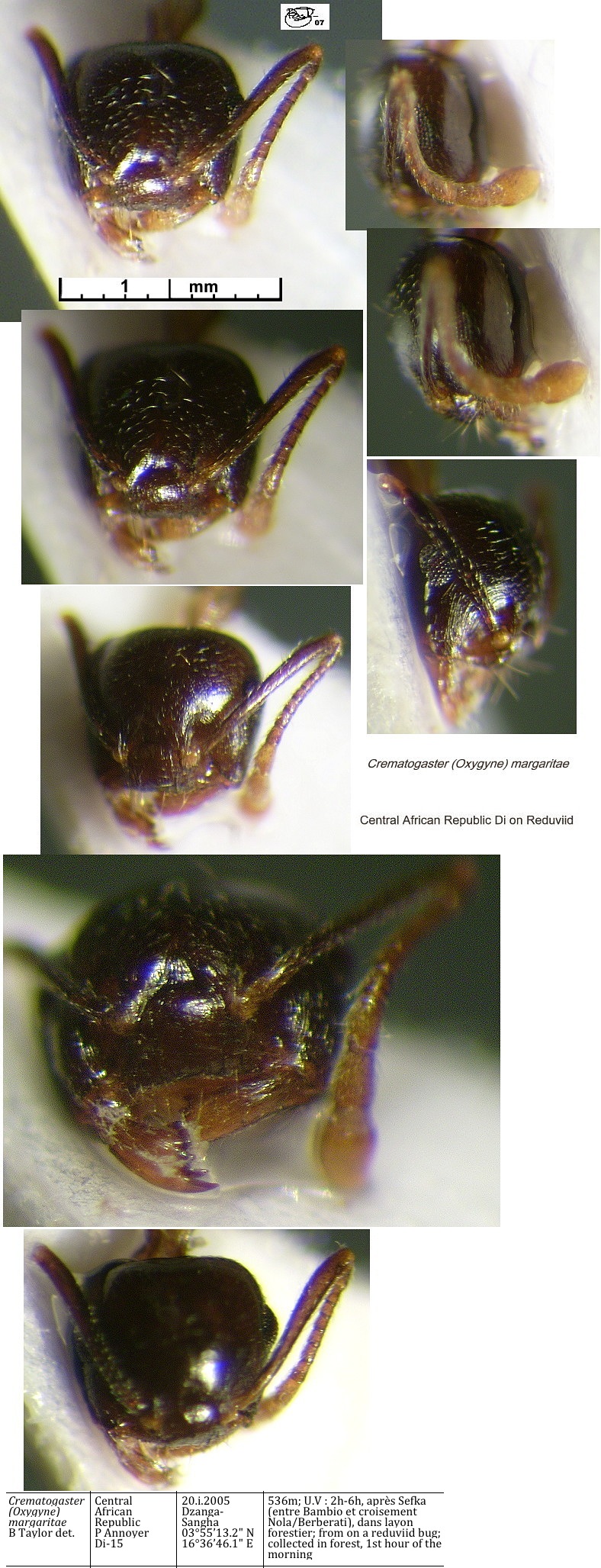 The photomontage is
of the head (only part found) of a worker from the Central African
Republic, Dzanga-Sangha
National Park; collector
Philippe Annoyer (CAR DN). The photomontage is
of the head (only part found) of a worker from the Central African
Republic, Dzanga-Sangha
National Park; collector
Philippe Annoyer (CAR DN).
|
Queen
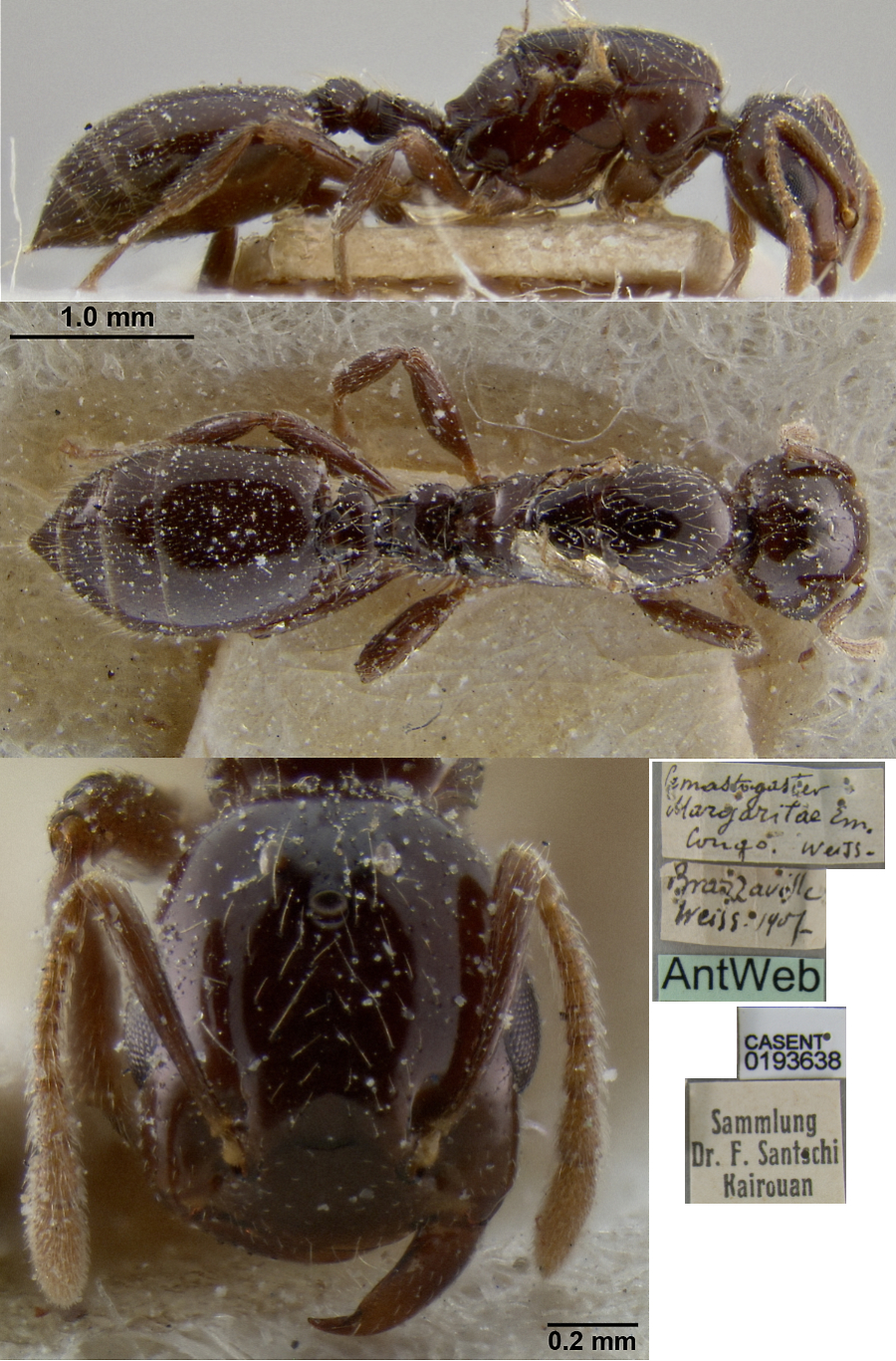 The
photomontage of the queen listed by Santschi (1910c) is collated from http://www.antweb.org/specimen.do?name=casent0193638.
The dimensions and other features match the two queens shown below. The
photomontage of the queen listed by Santschi (1910c) is collated from http://www.antweb.org/specimen.do?name=casent0193638.
The dimensions and other features match the two queens shown below.
|
 The photomontage
is of a queen from the Central
African Republic, Dzanga-Sangha National Park; collector Philippe
Annoyer (CAR LS).. The photomontage
is of a queen from the Central
African Republic, Dzanga-Sangha National Park; collector Philippe
Annoyer (CAR LS)..
|
 The photomontage
is of a damaged queen from the Central
African Republic, Dzanga-Sangha National Park; collector Philippe
Annoyer (CAR FG 1). The photomontage
is of a damaged queen from the Central
African Republic, Dzanga-Sangha National Park; collector Philippe
Annoyer (CAR FG 1).
|
|